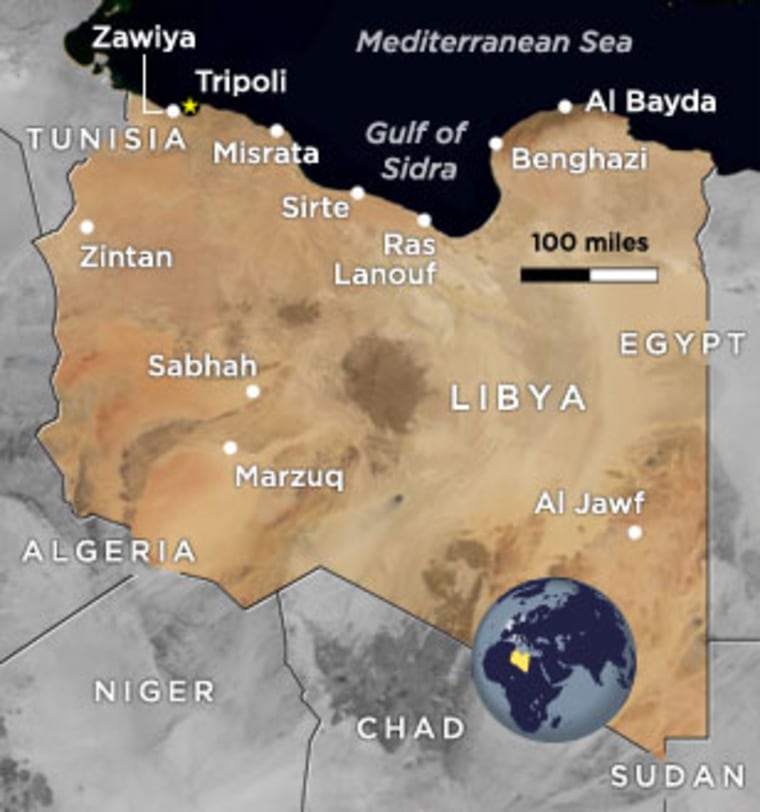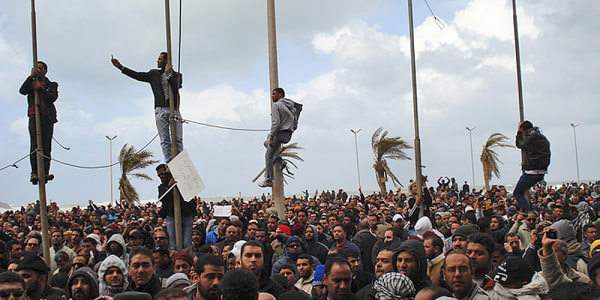Libya's ramshackle rebel army has pushed west to retake a series of towns from the forces of Moammar Gadhafi who are being pounded by Western airstrikes.
Emboldened by the help of the airstrikes, the rebels have rapidly reversed military losses in their five-week insurgency and regained control of all the main oil terminals in eastern Libya, as far as the town of Bin Jawad.
Rebels said Sunday they now had their sights on the coastal town of Sirte, Gadhafi's hometown and an important military base about 150 km (90 miles) further along the coast.
On Monday, a rebel spokesman said the town was captured by rebel forces. No independent verification was immediately available.
Celebratory gunfire was heard in rebel stronghold of Benghazi, NBC's Richard Engel reported Monday.
A Reuters reporter saw a convoy of 20 military vehicles including truck-mounted anti-aircraft guns leaving Sirte and moving westwards toward Tripoli on Sunday, along with dozens of civilian cars carrying families and stuffed with personal belongings.
"We want to go to Sirte today. I don't know if it will happen," said 25-year-old rebel fighter Marjai Agouri as he waited with 100 others outside Bin Jawad with three multiple rocket launchers, six anti-aircraft guns and around a dozen pickup trucks mounted with machineguns.
The advance along Libya's Mediterranean coast by a poorly armed and uncoordinated force of volunteer rebels suggested that Western strikes under a U.N. no-fly zone were shifting the battlefield dynamics dramatically, in the east at least.
The rebels are now back in control of the main oil terminals in the east -- Es Sider, Ras Lanuf, Brega, Zueitina and Tobruk -- while Gadhafi appears to be retrenching in the west.
Misrata fighting
Nearer the capital, Gadhafi's forces fought rebels in the center of Misrata, Libya's third city, to try to consolidate his grip on western Libya. Misrata is the only western city still in rebel hands and has been sealed off for weeks.
A resident called Saadoun told Reuters by phone that at least eight people were killed and 24 wounded when Gadhafi's forces fired mortar shells while attacking Misrata from the west in a day of fighting.
Pro-Gadhafi snipers were also pinning down rebel forces but late Sunday night the fighting died down.

A rebel called Mohammed told Reuters by phone that pro-Gadhafi forces controlled "only one small area, a couple of streets" in the western part of the city.
Residents told Reuters they were having to use wells to get water and that medicines were in short supply.
At least six blasts resonated in Tripoli Sunday night, followed by long bursts of anti-aircraft fire by Libyan forces. Libyan television said there had been airstrikes on the "civilian and military areas" in the capital.
Libyan state TV broadcast what it said was live footage of Gadhafi in a car in his Tripoli compound where hundreds of supporters waved green flags and chanted slogans. Gadhafi could not be seen in the white car but the TV said he was in it.
Sunday, NATO agreed to take full command of military operations in Libya after a week of heated negotiations, officials said, as Washington seeks to scale back its role in another Muslim country after operations in Iraq and Afghanistan.
Slideshow 81 photos
Libya's uprising against Gadhafi
U.S. Defense Secretary Robert Gates said Western airstrikes had "eliminated" Gadhafi's ability to move his heavy weapons.
Gates also raised the possibility that Gadhafi's government could splinter and said an international conference in London on Tuesday would discuss political strategies to help bring an end to Gaddafi's 41-year rule.
Libya accused NATO of "terrorizing" and killing its people as part of a global plot to humiliate and weaken the North African country.
The government says Western-led air attacks have killed more than 100 civilians, a charge denied by the coalition which says it is protecting civilians from Gadhafi's forces and targeting only military sites to enforce the no-fly zone.
"The terror people live in, the fear, the tension is everywhere. And these are civilians who are being terrorized every day," said Mussa Ibrahim, a Libyan government spokesman.
"We believe the unnecessary continuation of the airstrikes is a plan to put the Libyan government in a weak negotiating position. NATO is prepared to kill people, destroy army training camps and army checkpoints and other locations."
Ibrahim acknowledged that rebel forces in the east were advancing westwards but declined to give any details on the retreat of government troops.
He said three Libyan civilian sailors were killed in a coalition airstrike on a fishing harbor in the city of Sirte Saturday.
Oil impact
Now that the rebels have regained control of key oil ports, they are making tentative plans to exploit Libya's most valuable natural resource. But production is at a trickle, the foreign oil workers and their vital expertise have fled the country, and even talk of a marketing deal with Qatar seems murky at best.
"As they move round the coast, of course, the rebels will increasingly control the exit points of Libya's oil," British Defense Secretary Liam Fox told the BBC. "That will produce a very dynamic and a very different equilibrium inside Libya. How that will play out in terms of public opinion and the Gadhafi regime remains to be seen."
The agreement with the tiny Gulf nation of Qatar could allow the rebels to exploit Libya's vast oil reserves — most of which are in the eastern territory they control. With no ships coming or going, Libya's tanks are full to the brim. Until they are emptied, there's nowhere to store any oil that is pumped from the ground.
Qatar, which has conducted at least one sortie over Libya, is the only Arab country known to have actively joined with the international force.
"We trust them, so basically they are the ones who are going to market our oil for us," Ali Tarhouni, the rebel finance official, told The Associated Press on Friday. "For Qatar there's no words to describe what they've done for the Libyan cause."
Officials at Qatar's ministry of energy and industry could not be reached for comment. Executives with the Arabian Gulf Oil Co., the National Oil Co. subsidiary in the east that broke free from its parent company, also could not be reached. Repeated calls to Libya's oil minister went unanswered.
Eastern oil officials said over a week ago they were still producing about 100,000 barrels per day from two key fields. But it was unclear whether such levels were sustainable given the security problems across the country and the exodus of foreign workers from the vital sector.
The Paris-based International Energy Agency said recently it believed that Libyan oil production had "slowed to a trickle" while exports had "ground to a halt." The IEA said it believed it could take months for Libyan oil to reappear on the world market.
